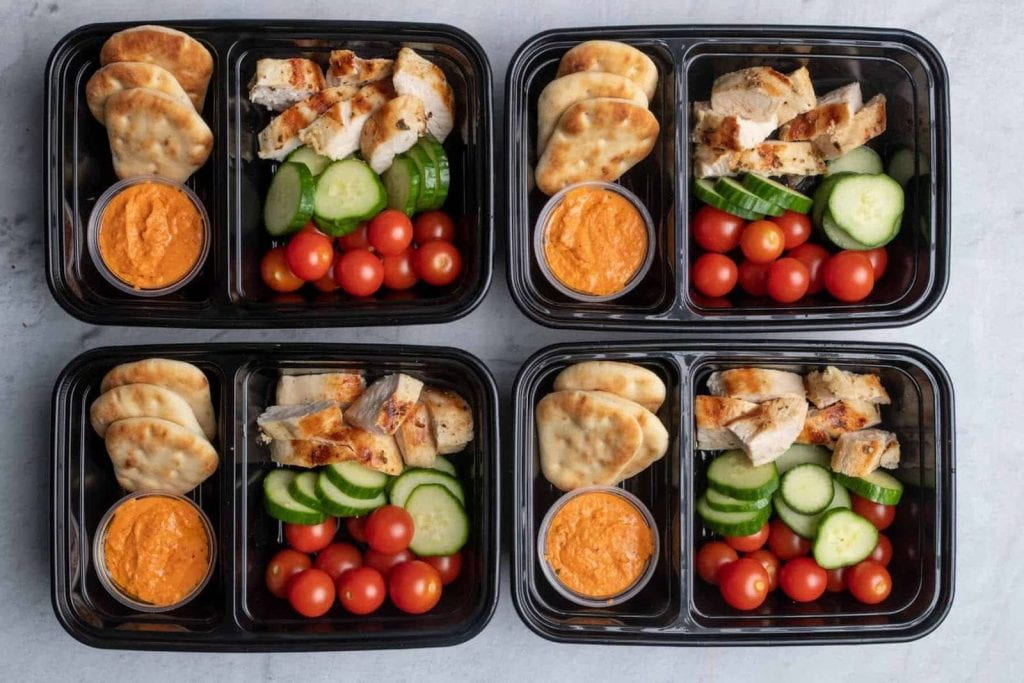Sustainable and Low Waste Meal Prep

When I moved away from home and moved into the dorms at USF, having healthy and accessible meals was never a worry for me. Living in the dorms, students are required to have a meal plan which ensures access to balanced and complete meals. The food on campus is made in bulk and sold in individual portions, which leaves little worry for students. This system takes away the stress that comes with buying groceries, prepping meals, and avoiding food waste.
When I moved off campus and out of the dorms, I was hit with the reality that having healthy and accessible meals can be a challenge. For many college students, grocery shopping as an individual rather than for a larger group or family can be difficult. For myself at least, food waste can be very easy to produce. For example, a pack of vegetables purchased at the grocery store could go bad because an individual is not able to go through it fast enough on their own. Additionally, making every one of your meals can be difficult when you are keeping health and balance in mind. While cheap, microwaveable meals are easy, and eating-out is convenient and fun, these are not sustainable nor healthy. So how can we improve our eating habits in this situation?
Meal prepping can be a great solution to this problem. Meal prepping is essentially buying food in bulk, preparing it all at once, packaging the food into individual meals, then refrigerating or freezing those meals to be enjoyed in the future. The practice of meal prepping introduces individuals to preparing healthy meals with low waste. This article presents a number of tips on how you can meal prep in a sustainable way while also nourishing your body.
1. Have a plan when going to the grocery store
At the grocery store, many people may add items to their cart as they see them because they look good at the moment. To meal prep in a way that is good for your body and good for your wallet, try going to the grocery store with a plan. Have a few meals in mind and write down a list of items you need to make those meals. Get any snacks you’d like, but definitely have an idea of meals you could eat for breakfast, lunch, and dinner. This will take a lot of stress away from you when it comes down to actually making those meals!
2. Buy in bulk
Buying food in bulk could mean buying a week’s worth of food or even just a few days’ worth of food. Rather than shopping for individual meals, try shopping for something you could eat for multiple meals throughout the week. Let’s say you meal prep dinner that consists of pasta, your choice of protein, and vegetables. Rather than purchasing an individual meal for that night only, purchase a family sized amount of food. When you get back home, prepare the food and portion it out into individual meals. You can store it in the fridge if you’ll eat it that week or in the freezer if you’ll eat it even later on. When it comes time for lunch or dinner the following day, you don’t have to worry about going shopping or preparing a new meal!
Buying in bulk is great because bulk items typically have less packaging than buying multiple smaller or individual items. You will be producing less packaging waste!
3. Freeze or refrigerate
As mentioned before, you can freeze or refrigerate your meals after preparing them. This is a great low waste tip because it means no food will be thrown away. You are the one to portion out your own meals and because you know yourself the best, you know how much food you will actually eat.
4. Eat healthy while on the go
While I am an advocate for sitting down and enjoying your meals (even better if you enjoy it with friends or family), we all live busy lives, and sitting down may not be possible for everyone. The great thing about meal prepping is that your prepared meals are ready to go at anytime. While you can certainly enjoy your prepared meals at home, they are also easy to take to school, work, to a picnic, you name it! Meal prepping means you spend less time shopping, cooking, and cleaning up, yet can still eat healthy. While preparing a large amount of food may take time, it saves so much time in the long run and is worth it in the end.
5. Use reusable containers
When meal prepping, you need a way to store your meals. Rather than using single use containers, try reusable containers. Not only is this better for the environment, but it is cheaper in the long run! Regular tupperware works, but there are also meal prep specific containers that help with portion control.
Hopefully these tips can help you start your meal prep journey! If you are a student living off campus, it is a great practice to become familiar with. If you are a student on campus, these tips are a great way of preparing you for when you no longer have a university meal plan. Overall, it is a very sustainable and healthy way to eat well in your otherwise very busy schedules.


